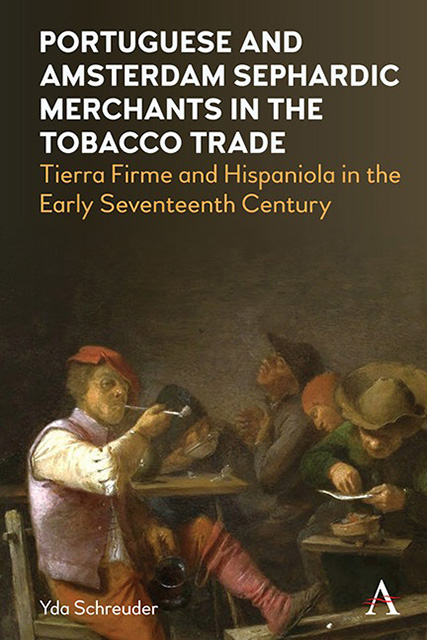 Portuguese and Amsterdam Sephardic Merchants in the Tobacco Trade
Portuguese and Amsterdam Sephardic Merchants in the Tobacco Trade Book contents
- Frontmatter
- Contents
- List of Figures
- Preface
- Chapter 1 Portuguese and Amsterdam Sephardic Merchants in The Tobacco Trade in The Early Seventeenth Century
- Chapter 2 The Contraband Tobacco Trade With Spanish America: Tierra Firme and Hispaniola
- Chapter 3 Portuguese Merchants and The Tobacco Trade With Tierra Firme
- Chapter 4 Portuguese Merchants and The Tobacco Trade With Hispaniola
- Chapter 5 Conclusion
- Bibliographic Notes
- Index
Chapter 3 - Portuguese Merchants and The Tobacco Trade With Tierra Firme
Published online by Cambridge University Press: 17 October 2023
- Frontmatter
- Contents
- List of Figures
- Preface
- Chapter 1 Portuguese and Amsterdam Sephardic Merchants in The Tobacco Trade in The Early Seventeenth Century
- Chapter 2 The Contraband Tobacco Trade With Spanish America: Tierra Firme and Hispaniola
- Chapter 3 Portuguese Merchants and The Tobacco Trade With Tierra Firme
- Chapter 4 Portuguese Merchants and The Tobacco Trade With Hispaniola
- Chapter 5 Conclusion
- Bibliographic Notes
- Index
Summary
Contraband and Trade Rivalry in the Eighty Years’ War
As described in the first two chapters, Dutch–Spanish and Dutch–Portuguese trade relations in the early seventeenth century were determined to a large extent by the ebb and flow of battles, embargoes, and trade protection measures in effect during the Eighty Years’ War when the Dutch were at war with Habsburg Spain from 1568 to 1648 the time at the end of which the Dutch established hegemony in the Atlantic economy. Only during the Twelve Years’ Truce between the warring parties from 1609 to 1621 did some order of normalcy return to Iberian-Dutch commercial exchange but trade with Tierra Firme and the Spanish Caribbean islands remained off limits to Dutch merchants as Spanish trade and navigation rules and prohibitions remained in effect. For much of the time, trade rivalry between Habsburg Spain and the Dutch Republic continued unabated and sea battles occurred at regular intervals. At entry points to major rivers where the Spanish held sway over self-declared territorial rule, embargoes and blockades were imposed by both parties and thus trade and navigation was regularly obstructed. Along the coasts of Tierra Firme and the Caribbean islands Dutch merchants tried to undermine Spanish control and intrude upon Spanish territory with some resolve but often only temporarily. Brazil was a Portuguese possession but as Portugal was united with Spain from 1580 until 1640, Spanish territorial control and trade restrictions affected Brazil as well even though Portugal continued to trade on a semi-autonomous basis. In any event, all Dutch trade as well as trade conducted by Sephardic merchants resident in the Dutch Republic was illegal trade as far as the Spanish were concerned and therefore, typically, not recorded contractually. So, in effect, we have only incidental evidence of the Dutch–Spanish and Dutch–Portuguese tobacco trade from official freight records in the Notary Public records in the City Archive of Amsterdam for the early seventeenth century as discussed in the previous chapters.
Dutch mariners were trespassers and illegal merchants in the Iberian colonial world and in the traditional carrying trade with the Iberian Peninsula, including Portuguese ports, which were officially blocked from 1580 until the start of the Twelve Years’ Truce (1609–1621).
- Type
- Chapter
- Information
- Portuguese and Amsterdam Sephardic Merchants in the Tobacco TradeTierra Firme and Hispaniola in the Early Seventeenth Century, pp. 63 - 98Publisher: Anthem PressPrint publication year: 2023


